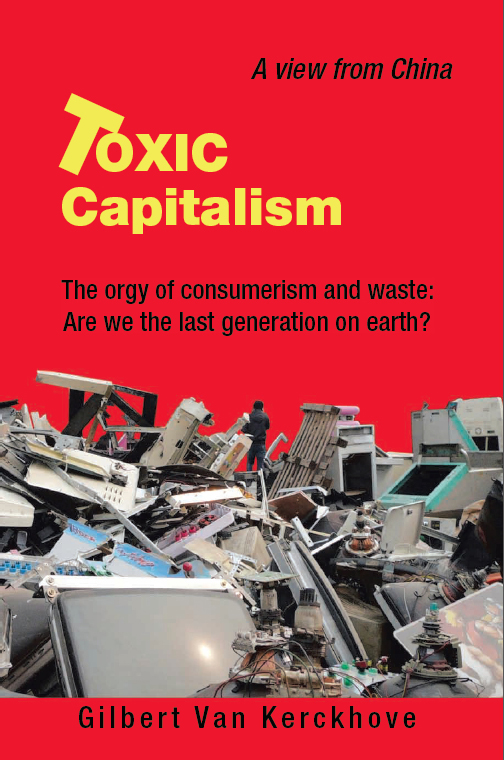In his new book, Toxic Capitalism, European Chamber Public Procurement Working Group Chair Gilbert Van Kerckhove calls attention to an aberrant strain of capitalism being practiced in Europe, the United States, and now China, and suggests how its direction might be changed to create a sustainable world.
 Tell us about the title of your book. Is it about capitalism, environmentalism, or is it about the two colliding?
Tell us about the title of your book. Is it about capitalism, environmentalism, or is it about the two colliding?
The book is about the impact of a bad strain of capitalism on the environment. It is the collision between the promotion of excessive consumption and the health of our planet.
Is European business playing a positive or negative role in China’s environmental protection?
European companies have a lot of expertise in terms of environmental protection: how to minimise pollution and damage to the environment, how to clean up water, air and soil, how to save energy and natural resources. As mentioned in the book, for example, the construction industry in China is plagued by poor quality, high energy and water consumption and insufficient training of construction workers. Europe has a lot to offer to help China build efficient buildings that also last longer.
However, some European companies also contribute to China’s environmental problems by buying cheap products with poor quality and durability and at ridiculously low prices.
China is perhaps the largest consumer society in the world now. How can that society, in which many families are experiencing a semblance of material wealth for the first time, be shifted to a different direction?
China is facing the difficult task to impose better quality and durability of products and services and to fight against indiscriminate waste. It will require solid government policies to aid the industry to improve quality and after-sales services, and to protect the interest of consumers. As mentioned in the book, we already see a trend that Chinese consumers look for better quality products, hence the appeal of some foreign brands. For China it is a challenge, many people still have little buying power so prices should remain reasonable while waste through shoddy products should be avoided.
Does Europe or any other region or nation have the moral authority to suggest that China should develop differently than it did?
The Western world has a responsibility to promote a sustainable consumption and way of life. Too often China is blamed for being the big polluter, for treating their workers badly and for delivering shoddy products. But as long as the West does not insist on better quality and durability and does not pay a fair price, the Chinese industry will be tempted to cut corners, not respecting environmental and labour laws, as the margins are too thin and foreign buyers make good money with the low-quality goods.
Foreign buyers should insist on a clean supply chain but that requires first of all paying the right price for good quality. Westerners can be hypocritical, happy to buy cheap leather goods while criticising the poisonous working conditions (glue and other chemicals) in the leather workshops. At least Europe is more conscious of the need to save energy and to become really green.
Is it capitalism itself that is toxic? Would socialism inherently be less toxic?
What is toxic capitalism? We are already familiar with toxic loans.
It is a strain of capitalism, invented in Europe, perfected by the Americans, and being assimilated by China and other countries. Hiding behind the mantra of open markets and dubious ideologies it is one type of capitalism with tragic consequences, allowing a minority to accumulate fortunes for themselves through political patronage and at the same time slowly destroying our planet by inducing us to embrace excessive consumption. It is toxic simply because of its impact on the environment. It is not the type of capitalism we should embrace.
The dramatic environmental deterioration in China, global warming, and the frantic quest for natural resources are all linked to it and to each other. It makes us buy too much and at too rapid a pace. Poor quality and the throw-away mentality let us slowly destroy our environment, while exhausting precious resources and even tearing down the fabric of society. Many people seem happy to go along.
Despite its shortcomings, capitalism is still the winner to make this world better and more advanced, and to bring people out of poverty. However, we should not go to a free-for-all extreme and we should make capitalism more human. Call it ‘capitalism with socialist characteristics’ if you want. Socialism can be as toxic as any other system if it does not genuinely care for efficiency, quality and durability; some communist and socialist regimes have also shown their failure to preserve the environment and to encourage real efficiency and innovation.
As a business organisation, and as you are a Working Group chair of that organisation, what role can the European Chamber play in all of this?
The European Chamber is already playing a role to help China improve quality, durability and efficiency. Our Public Procurement Working Group contributes through our efforts to make public tendering more transparent and fair for all; it is the way to deliver the best products and services to the Chinese customers at the best price. In our key recommendations we also insist to take into consideration the issues of life cycle cost and environmental concerns when evaluating tenders, and not only to go for the cheapest bid. The Chinese Government fully supports the principle but fair implementation is where more efforts are needed.
To purchase a copy of Toxic Capitalism, click here.


A very cathartic read. Nice job, Gilbert. Adam